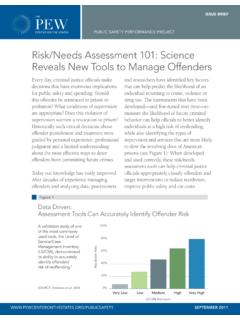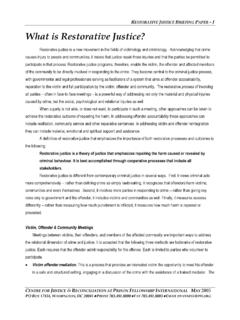Transcription of A Sourcebook of Delinquency Interventions - MDFT
1 Lea A Sourcebook of Delinquency Interventions FLORIDA DEPARTMENT OF JUVENILE JUSTICE Office of Program Accountability 2015 Table of Contents Disclaimer .. 1 Foreword .. 3 Delinquency Interventions .. 5 Name of Program and Acronym .. 6 Evidence-Based Practices .. 7 Adolescent Community Reinforcement Approach (A-CRA) .. 6 Aggression Replacement Training (ART ) .. 8 Aggression Replacement Training .. 11 Cannabis Youth Treatment (CYT) .. 14 EQUIP .. 17 Functional Family Therapy (FFT) .. 19 LifeSkills Training (LST) .. 21 Moral Reconation Therapy .. 24 Multidimensional Family Therapy (MDFT) .. 26 Multisystemic Therapy (MST) .. 30 Multisystemic Therapy for Youth with Problem Sexual Behaviors (MST-PSB) .. 35 Parenting with Love and Limits (PLL) .. 38 Seven Challenges .. 40 Thinking for a Change (T4C) .. 42 Promising 44 Brief Strategic Family Therapy.
2 46 Bullying Prevention Program .. 48 Dialectical Behavioral Therapy (DBT) .. 50 Family Behavior Therapy (FBT) .. 52 Functional Family Parole (FFP) .. 54 Multisystemic Therapy Family Integrated Transitions (MST-FIT) .. 56 Project Toward No Drug Abuse (TND) .. 58 Promoting Alternative Thinking Strategies (PATHS) .. 60 Stop Now and Plan (SNAP) .. 64 Strengthening Families Program (SFP) .. 67 Practices with Demonstrated Effectiveness .. 70 ARISE .. 72 ARISE Life-Skills .. 74 Big Brothers Big Sisters Mentoring Program .. 76 Corrective Thinking (Truthought) .. 78 Crossroads Juvenile Offender Curricula .. 79 Girls Circle .. 81 Girls Moving On .. 82 Impact of Crime: Addressing the Harm to Victims and the Community .. 83 New Freedom / Phoenix .. 84 Reasoning and Reacting .. 85 Skillstreaming the Adolescent .. 86 Strong African American Families (SAAF).
3 88 The Council for Boys and Young Men (Previously Boys Council) .. 90 YouthBuild .. 92 | 1 Disclaimer | 2 The Sourcebook is not all-inclusive: the information contained within is subject to change without notification. Interventions may be added as empirical evaluations are conducted and supported in the literature. The rankings of the Interventions are subject to change--A ranking for a particular intervention may increase as new empirical research is conducted using either a more methodologically rigorous design, or demonstrating the intervention to be more effective than in previous analyses. The ranking of a particular intervention may decrease as new research demonstrates the intervention to be less effective than previously reported. Furthermore, an intervention may be eliminated entirely from the Sourcebook in the event rigorous empirical research demonstrates the intervention to be iatrogenic or potentially harmful to the target population.
4 New versions of the Sourcebook , as developed, will be posted on the Florida Department of Juvenile Justice website, within the Bureau of Quality Improvement. It is the sole responsibility of the reader to ensure utilization of the most up-to-date version. Additionally, it is the sole responsibility of the reader to obtain the required training, certification, education, and licensure (if applicable) to facilitate any intervention described within. The Florida Department of Juvenile Justice is not liable for any licensure or copyright infringements by any individual or agency engaging in unlawful actions in the facilitation of the Interventions within. | 3 Foreword | 4 In 2008, the Programming and Technical Assistance (PTA) Unit compiled a list of Delinquency Interventions aimed at reducing recidivism and major dynamic risk factors, criminogenic needs, of juvenile offending.
5 These Interventions were rank-ordered into three tiers based on the extent to which they had been rigorously evaluated. The first ever Sourcebook of Delinquency Interventions separated practices into the categories still used today: Evidence-based Practices, Promising Practices, and Practices with Demonstrated Effectiveness. In recent years, the Sourcebook has been updated including this most recent 2013 edition. Several Interventions have been added to each tier, and practices have risen in ranking as new empirical evaluations have been conducted which advanced our understanding of an intervention s effectiveness. The Department continues with efforts to build sustainability of practices through the implementation of the Standardized Program Evaluation Protocol (SPEP) to include: qualified training, proper implementation, fidelity adherence and coaching of evidence-based Delinquency Interventions and best practices as well as research, development and pilot testing/evaluation.
6 Since publication of the 2010 Sourcebook , important milestones have been achieved in advancing the implementation of evidence-based and best practices within Florida. The SPEP process will help the Department evaluate the strengths and weaknesses of services with the goal of making them more accountable and effective in areas including: organizational culture, evidence-based Delinquency Interventions implementation and sustainability, management and staff characteristics, youth risk and needs assessment practices, program characteristics, behavior management strategies, inter-agency communication, and evaluation. In order to demonstrate the effectiveness of the implementation of evidence-based practices (EBP) within Florida, the provision of those services must be tracked. The Department has developed a module in the Juvenile Justice Information System (JJIS) dedicated to capturing the intervention services each youth receives.
7 The Evidence-based Services Module will collect data related to which specific evidence-based services, if any, that a particular youth receives while under the care and custody of the Department. Furthermore, the module will track the intensity and duration of those services, and whether the youth completed the service. The module will provide the hard empirical data necessary to illustrate to relevant stakeholders the benefits of providing evidence-based Interventions to youth. The goal of the Sourcebook remains to serve as a tool to sustain and advance efforts by providing a catalogue of examined practices by type as defined by The Florida Department of Juvenile Justice. | 5 Delinquency Interventions The purpose of implementing a Delinquency intervention is to prevent criminal and antisocial behavior, reduce recidivism for those already in the juvenile justice system, and reduce youths dynamic/changeable risk factors (termed criminogenic needs ) that are proven to be the major causes of juvenile criminal behavior.
8 There are three levels at which we define Delinquency Interventions . The level an intervention is placed within is dependent on the empirical research conducted on that practice, and the results of those analyses. The levels progress in terms of methodological rigor and effectiveness of the practice, with evidence-based practices requiring the highest level of rigor and the highest level of program success with results lasting at least one year from completion. The levels and their respective definitions are as follows: Practices with Demonstrated Effectiveness: Practices based on general principles, strategies, and modalities reported in criminological, psychological, or other social science research as being effective with a juvenile population. These practices should be outlined in a format that ensures consistent delivery by the facilitator across multiple groups.
9 Promising Practices: Manualized curricula are those that have been evaluated and found to reduce the likelihood of recidivism or at least one criminogenic need with a juvenile offending population. The evaluation must have used sound methodology, including, but not limited to, random assignment or quasi-experimental design, use of control or comparison groups, valid and reliable measures, and appropriate analysis. Such studies shall provide evidence of statistically significant positive effects. In addition, there must be evidence that replication by different implementation teams at different sites is possible with similar positive outcomes. Evidence-Based Practices: Treatment and practices which have been independently evaluated and found to reduce the likelihood of recidivism or at least two criminogenic needs, with a juvenile offending population.
10 The evaluation must have used sound methodology, including, but not limited to, random assignment, use of control groups, valid and reliable measures, low attrition, and appropriate analysis. Such studies shall provide evidence of statistically significant positive effects of adequate size and duration. In addition, there must be evidence that replication by different implementation teams at different sites is possible with similar positive outcomes. Each of the Interventions has specific requirements for implementation and facilitation. Many practices, both promising and evidence-based, can be delivered regardless of educational attainment of the facilitator, provided the staff successfully completed training in the specific practice. Furthermore, many promising and evidence-based practices are proprietary, while others are not and are free with the exception of the training cost.






